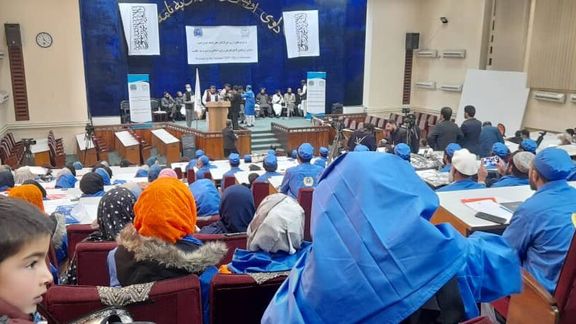Taliban Leader Closes Medical Institutes For Girls

Taliban leader Mullah Hibatullah issued a decree blocking all higher and semi-medical education institutions for girls. The Taliban's Ministry of Public Health announced to health institute officials on Monday that girls are no longer allowed to study in these centres.
Despite the closure of universities and schools for girls, they continued to study in health institutes and were trained in fields such as midwifery, pharmacy, laboratory, X-ray, physiotherapy, nursing, and prosthodontics.
The head of a private institution in Kabul told Afghanistan International that the Taliban's Minister of Public Health summoned the officials of the institutes and informed them of Mullah Hibatullah's order.
He added that the Taliban's Minister of Public Health emphasised that women and girls are not allowed to enter health institutes as of Monday (December 2).
According to the source, "The Taliban's Minister of Public Health had summoned them to the ministry without saying what the meeting was about. He did not even allow questions about Mullah Hibatullah's new order."
Another source told Afghanistan International that according to Mullah Hibatullah's new decree, all governmental and non-governmental health institutions have been closed to girls.
"Most of our students were women, but today they all stayed at home," said the head of a health institute in Kabul.
After the ban on girls' education, it has become difficult or even impossible for these institutes to continue operating, the source added, as the majority of their students were women.
Health institutes were the last place where women and girls could continue their education, but now they have been denied the opportunity, the source said.
Health institutes on Monday have informed their students not to attend classes starting Tuesday (December 3).
Now, with the closure of health educational institutions, the crisis of shortage of gynaecologists and nurses in Afghanistan will intensify.
After returning to power, the Taliban closed schools above the sixth grade to girls and then banned them from attending universities. These restrictions were gradually expanded to include a ban on women working in governmental and non-governmental organisations. In addition, women were also prohibited from going to parks, baths, hairdressers, and traveling without a male relative.
The Taliban's restrictions on women have sparked widespread reactions at the international level. The UN Human Rights Office and some countries have described these actions as a clear violation of human rights, an example of crimes against humanity, and an example of gender apartheid.
A number of countries have referred cases of violations of women's rights to the Hague Court, but the Taliban has increased restrictions and prohibitions for women in response.